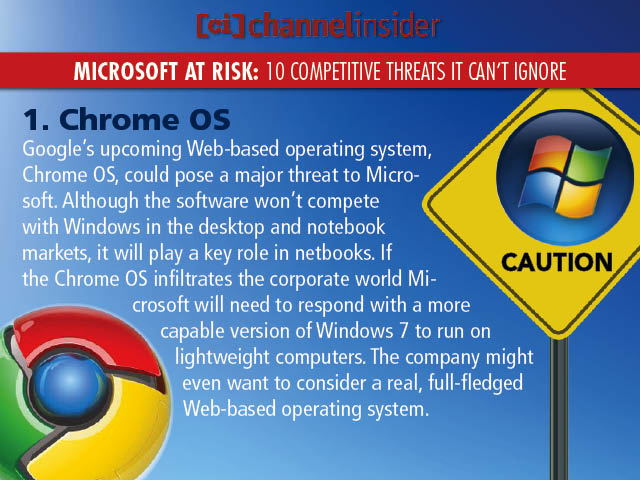 Microsoft At Risk 10 Competitive Threats It Can’t Ignore
Microsoft At Risk 10 Competitive Threats It Can’t Ignore
1. Chrome OS Google’s upcoming Web-based operating system, Chrome OS, could pose a major threat to Microsoft. Although the software won’t compete with Windows in the desktop and notebook markets, it will play a key role in netbooks. If the Chrome OS infiltrates the corporate world Microsoft will need to respond with a more capable version of Windows 7 to run on lightweight computers. The company might even want to consider a real, full-fledged Web-based operating system.
 No Title
No Title
2. HP’s WebOS It might sound crazy at this point for Microsoft to worry about WebOS when HP acquired the software from Palm just a few months ago, but the software giant should keep a close eye on HP’s plans for WebOS. The mobile operating system has a lot of potential, thanks to its focus on Web technology. If HP can leverage its presence in the corporate world with WebOS’ focus on connectivity, HP could have a major hit on its hands. And Microsoft will need to respond.
 No Title
No Title
3. Apple’s iPad Apple’s iPad may not be a big threat in the enterprise now, but it may become one. That’s because iPad is designed for anyone who wants to be more productive while on-the-go. Sure, iPad lacks several features like multitasking and Flash support, but business-friendly features will be making their way to the tablet. When that happens, Microsoft will need to watch out.
 No Title
No Title
4. Apple’s iPhone The iPhone could be one of the biggest threats facing Microsoft in the corporate world. Although iPhone still trails RIM’s BlackBerry, it’s adding new enterprise customers each day. Windows Mobile on the other hand, looks like the hobbled alternative. And although Microsoft has big plans for Windows Phone 7, that software looks more targeted towards consumers. If Microsoft isn’t careful, it will be pushed out of the mobile enterprise market.
 No Title
No Title
5. Google Search Google Search could make or break Microsoft online. Google dominates here. But by the end of the year, Microsoft hopes to have Yahoo Search running alongside Bing. When that happens, the company’s market share will catapult in the search space, and the race will be on between the two tech giants. Without the proper moves, Microsoft could find itself cornered out of the single market that could mean the difference between future success and failure for Microsoft.
 No Title
No Title
6. Cisco Tablets Cisco tablets might not seem like an obvious threat to Microsoft, since they have yet to hit store shelves and few details are known. But given how closely Cisco is tied to the corporate world, the company’s tablets could very well become the new standard in the mobile-enterprise space. When that happens, Microsoft can expect Google to play a role. According to Cisco, its new tablet will run on Android OS. Could it be Google’s first foray into the enterprise space? It seems highly likely.
 No Title
No Title
7. Windows Security Windows security could have a profound impact on the success or failure of Microsoft in the business realm. For years, companies have been plagued with Windows security problems. And for years, Microsoft has done a less than adequate job of making things right. Enough is enough. If Microsoft wants to be as successful over the next ten years as it was in the past ten years, the company must improve security. The pressure is on.
 No Title
No Title
8. Internet Explorer Microsoft’s Internet Explorer could be more of a liability today than an asset. Although IE has been Microsoft’s user’s gateway to the Internet, it’s riddled with security problems that have driven users away. Perhaps it’s time Microsoft makes one of two decisions: it either fixes Internet Explorer or does away with it. And since the second option isn’t likely, it’s about time Microsoft moves on with the first.
 No Title
No Title
9. RIM’s BlackBerry RIM’s BlackBerry is arguably the most important mobile device available in the enterprise right now. More enterprise users rely on BlackBerry than any other smartphone. Microsoft, with its upcoming Windows Phone 7 OS, must find a way to take down the BlackBerry. The BlackBerry is too dangerous for it not to do so.
 No Title
No Title
10. Innovation As the rest of the tech industry starts innovating around it, Microsoft is left to wonder if it has what it takes to compete. Although the company’s new Windows Phone 7 promises new innovations, much of what it has offered, especially in the corporate space, just doesn’t measure up to what other companies have done. Can Microsoft meet the challenge?

